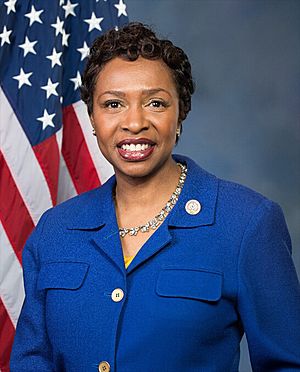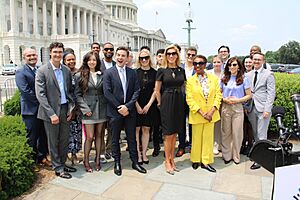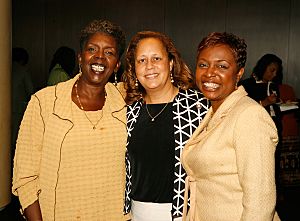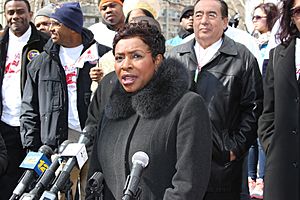Yvette Clarke facts for kids
Quick facts for kids
Yvette Clarke
|
|
|---|---|

Official portrait, 2017
|
|
| Chair of the Congressional Black Caucus | |
| Assumed office January 3, 2025 |
|
| Preceded by | Steven Horsford |
| Member of the U.S. House of Representatives from New York |
|
| Assumed office January 3, 2007 |
|
| Preceded by | Major Owens |
| Constituency | 11th district (2007–2013) 9th district (2013–present) |
| Member of the New York City Council from the 40th district |
|
| In office January 1, 2002 – December 31, 2006 |
|
| Preceded by | Una S. T. Clarke |
| Succeeded by | Mathieu Eugene |
| Personal details | |
| Born |
Yvette Diane Clarke
November 21, 1964 New York City, New York, U.S. |
| Political party | Democratic |
| Relatives | Una S. T. Clarke (mother) |
| Website | |
Yvette Diane Clarke (born November 21, 1964) is an American politician. She serves as a U.S. Representative for New York's 9th congressional district. She has held this position since 2013. A member of the Democratic Party, she first joined Congress in 2007. Before that, she represented the 40th district in Brooklyn on the New York City Council from 2002 to 2006.
Contents
Early Life and Education
Yvette Clarke was born in Flatbush, Brooklyn, on November 21, 1964. Her parents, Lesley Clarke and former city councilwoman Una Clarke, were immigrants from Jamaica. She went to Edward R. Murrow High School. She then received a scholarship to attend Oberlin College in Ohio from 1982 to 1986. During her time at Oberlin, she interned in Washington, D.C.. She worked in the office of Representative Major Owens, focusing on trade issues for Caribbean-Americans.
Reports in 2006 mentioned that her college records did not show she had graduated. Clarke later said she had completed her degree by taking courses at Medgar Evers College.
Early Career
Before becoming a politician, Clarke worked as a childcare specialist. She also trained people in her community to care for children whose parents were working. Later, she worked as an assistant for State Senator Velmanette Montgomery and Assemblywoman Barbara Clark. Clarke also directed business development for the Bronx Overall Economic Development Corporation. She was also the second director for the Bronx part of the New York City Empowerment Zone.
New York City Council
In 2001, Clarke was elected to the 40th district of the New York City Council. She took over the seat from her mother, Una S. T. Clarke. This was the first time a mother and daughter had served in the city council one after the other.
While on the City Council, she supported resolutions against the Iraq War. She also criticized the federal USA PATRIOT Act and called for an end to the death penalty. She often spoke out against the policies of the Bush administration. She opposed budget cuts to programs that helped women and people in poverty.
She served on several committees, including:
- Committee on Contracts (chair)
- Committee on Education
- Committee on Fire and Criminal Justice Services
- Committee on Health
- Committee on Land Use
- Committee on Planning, Dispositions and Concessions
- Committee on Rules, Privileges and Elections
U.S. House of Representatives
District
Yvette Clarke's district was redrawn in 2013. It includes several neighborhoods in Brooklyn. Some of these are Sheepshead Bay, Brownsville, Crown Heights, East Flatbush, and Flatbush.
Tenure
In April 2007, Clarke was the only member of Congress to vote against renaming the Ellis Island Library after Bob Hope. She believed the museum was greater than any one person.
In 2009, she wrote a bill to improve how people are removed from the No Fly List if they were wrongly identified as a threat. This bill passed with strong support. In March 2010, she introduced the International Cybercrime Reporting and Cooperation Act. This act aimed to improve how countries report and cooperate on cybercrime.
Clarke supported the Prison Ship Martyrs' Monument Preservation Act. This bill would study making the Prison Ship Martyrs' Monument in Fort Greene Park a part of the National Park System. She said the monument reminds us to protect human rights, even during wartime.
In September 2013, Clarke introduced the Homeland Security Cybersecurity Boots-on-the-Ground Act. This bill aimed to improve the cybersecurity workforce at the United States Department of Homeland Security (DHS). It would require DHS to create a plan for hiring and training more cybersecurity employees.
Committee Assignments
- Committee on Energy and Commerce
- Subcommittee on Communications and Technology
- Subcommittee on Commerce, Manufacturing and Trade
- Subcommittee on Oversight and Investigations (Ranking Member)
Caucus Memberships

- Black Maternal Health Caucus
- Congressional Black Caucus, Chair
- Congressional Caribbean Caucus, Chair
- Congressional Caucus on Multicultural Media, Chair
- Congressional Caucus on Black Women and Girls, Co-chair
- Congressional Caucus on Black Men and Boys, Co-chair
- Congressional Progressive Caucus
- Congressional Arts Caucus
- Medicare for All Caucus
- Congressional Caucus for the Equal Rights Amendment
- Congressional Caucus on Turkey and Turkish Americans
- Creator Economy Caucus Co-Chair
Policy Positions
Israel
Clarke supports a two-state solution for the Israeli–Palestinian conflict. She voted to provide Israel with support after the 2023 Hamas attack on Israel.
Budget, Spending, and Tax Issues
Clarke has generally opposed laws that reduce government spending and cut taxes. For example, she voted against extending tax cuts from the George W. Bush administration. She received a high rating from the National Journal for her liberal views on economic policy in 2011.
Environmental Policy
Clarke supports efforts to fight climate change and reduce the use of fossil fuels. She has generally opposed laws that prioritize economic interests over protecting the environment. She has supported laws that increase conservation and regulate the energy industry. She received 100% ratings from groups like Environment America and the League of Conservation Voters in 2011. She strongly disagreed with the Trump administration's decision to leave the Paris Agreement.
Immigration
Clarke has called for immigration reform. She supports creating a path to citizenship for undocumented immigrants in the United States. She also wants to shift resources away from enforcement. In 2010, she voted for the DREAM Act. She praised the Obama administration's DACA program. She also called for extending Temporary Protected Status for Haitian immigrants after the 2010 Haiti earthquake.
Technology
In April 2019, Clarke helped introduce the Algorithmic Accountability Act. This law would give the Federal Trade Commission more power. It would also require companies to check if their technology has biases based on race or gender. In June 2019, she introduced the Deepfakes Accountability Act.
In January 2022, Clarke asked the Cybersecurity and Infrastructure Security Agency (CISA) for more information. She wanted to know about their efforts to improve security for federal networks. She believes using multi-factor authentication is important for protecting these systems.
Clarke introduced an updated Deepfakes Accountability Act in September 2023. This act aims to protect national security from deepfake technology. It also provides legal options for victims of harmful deepfakes.
In the Media
In September 2012, on the Colbert Report, Stephen Colbert asked Clarke what she would change if she could go back to 1898, when Brooklyn joined New York City. Clarke answered the abolition of slavery. Colbert pointed out that slavery was abolished in New York State in 1827. Clarke's media representative later said her comments were meant as a joke.
2016 Presidential Election
Clarke supported Hillary Clinton for president in 2016. She cast a vote for Clinton as a superdelegate at the 2016 Democratic National Convention. During Clinton's campaign, Clarke appeared with her at an event at Medgar Evers College.
Political Campaigns

In 2004, Yvette Clarke first ran for Congress for the 11th district. She ran against the person currently holding the seat, Major Owens. Her mother had also run against Owens in 2000. Clarke lost the 2004 Democratic primary to Owens.
After the 2004 election, Owens decided not to run again. Clarke then announced she would run in 2006.
2006 Election
In May 2006, another candidate, Assemblyman N. Nick Perry, left the race. This was thought to improve Clarke's chances of winning.
On September 12, 2006, Clarke won the Democratic nomination. She received 31.20% of the vote in a four-person primary. In the general election on November 7, Clarke was elected to the House of Representatives. She won with 89% of the vote against Republican Stephen Finger.
Later Elections
Clarke was reelected by large margins in 2008, 2010, 2012, 2014, and 2016.
In 2018, she narrowly won her primary election against Adem Bunkeddeko. She then defeated Republican Lutchi Gayot in the general election.
In 2020, Clarke faced a four-way Democratic primary. She ran against Adem Bunkeddeko, Chaim Deutsch, and Isiah James.
See also
 In Spanish: Yvette Clarke para niños
In Spanish: Yvette Clarke para niños
- List of African-American United States representatives
- Women in the United States House of Representatives
 | Sharif Bey |
 | Hale Woodruff |
 | Richmond Barthé |
 | Purvis Young |


